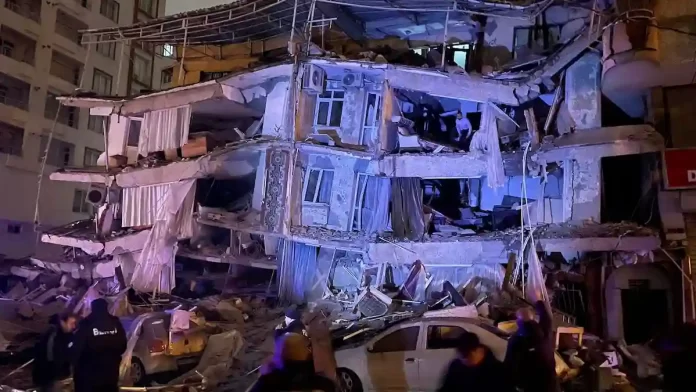A powerful earthquake measuring 7.8 on the Richter scale has struck Turkey killing hundreds of people and causing widespread damage and panic.
An earthquake is a natural disaster that can occur without warning, causing widespread damage and disruption.
While it may not be possible to prevent earthquakes from happening, it is important to be prepared and know how to respond to protect yourself and others.
Here are 10 safety tips to follow during an earthquake:
Drop, Cover, and Hold On
If you are indoors during an earthquake, drop to the ground, take cover under a sturdy piece of furniture, and hold on to it. This will help protect you from falling debris and other hazards. If you are in a crowded public place, stay away from windows, heavy objects, and tall furniture that could fall on you.
Evacuate if Necessary
If you are inside a tall building, a factory, or a high-rise, evacuate immediately if the building is severely damaged or if you feel unsafe. Use the stairs, not the elevator, to evacuate the building. Avoid using the telephone or other electrical equipment until you are safely outside.
Stay Away from Dangerous Areas
Stay away from coastal areas, dam spillways, and other areas that are prone to flooding, landslides, and other types of hazards. If you are in a car, pull over to the side of the road and stay inside the vehicle until the shaking stops. Avoid parking or stopping under bridges, overpasses, or power lines.
Protect Your Head and Neck
If you are unable to find shelter or if you are outdoors during an earthquake, try to find a clear space and protect your head and neck by crouching down and covering your head with your arms. Do not stand near or under trees, buildings, or other structures that could fall on you.
Be Prepared for Aftershocks
Aftershocks are smaller earthquakes that can occur after the main shock. They can cause additional damage to buildings and other structures that are already weakened. Be prepared for aftershocks and be ready to evacuate if necessary.
Check for Injuries
After an earthquake, check yourself and others for injuries. If you are injured, try to stay calm and seek medical attention as soon as possible. If someone is seriously injured, do not move them unless they are in immediate danger.
Turn Off Gas and Electrical Equipment
If you smell gas or if you hear hissing or smell gas, turn off the gas and evacuate the building immediately. If you are able, turn off all electrical equipment and unplug appliances to prevent electrical fires.
Check for Damage
After an earthquake, inspect your home and other structures for damage. Check for cracks in walls, foundations, and roofs, and look for broken windows, pipes, and electrical lines. Report any damage to the appropriate authorities.
Be Prepared for Power Outages
During an earthquake, power outages are common. Be prepared by keeping flashlights, battery-operated radios, and other essential items on hand. Store plenty of water and non-perishable food in case of an extended power outage.
Follow the News
Stay informed about the latest developments during and after an earthquake by listening to the radio, television, or internet. Follow the advice of local authorities, including evacuation orders and warnings about hazardous conditions.
In conclusion, earthquakes can be terrifying, but being prepared and knowing what to do can help keep you safe.
Remember to drop, cover, and hold on if you are indoors, evacuate if necessary, and stay away from dangerous areas.
Protect your head and neck, be prepared for aftershocks, check for injuries, turn off gas and electrical equipment, check for damage, be prepared for power outages.
